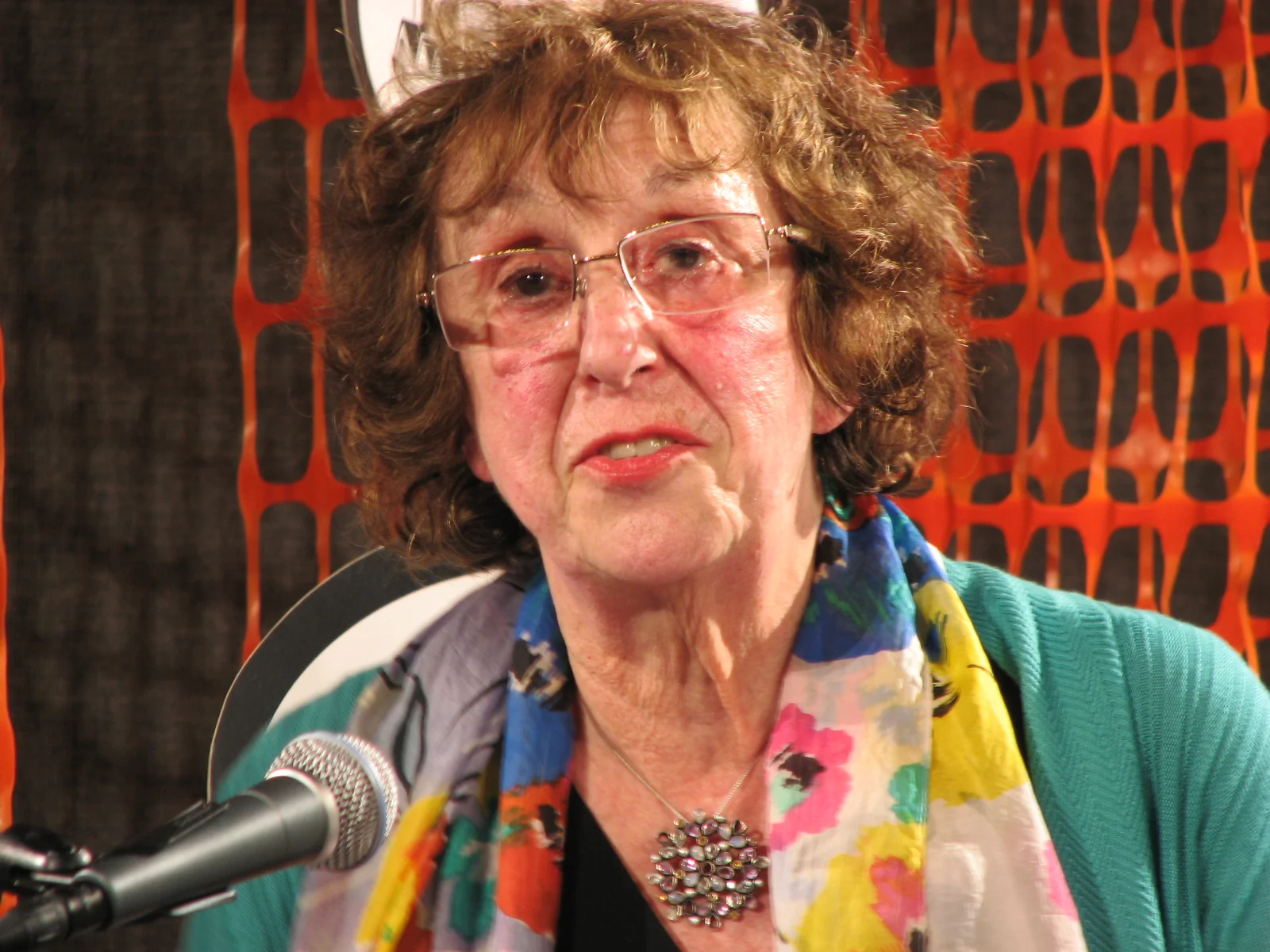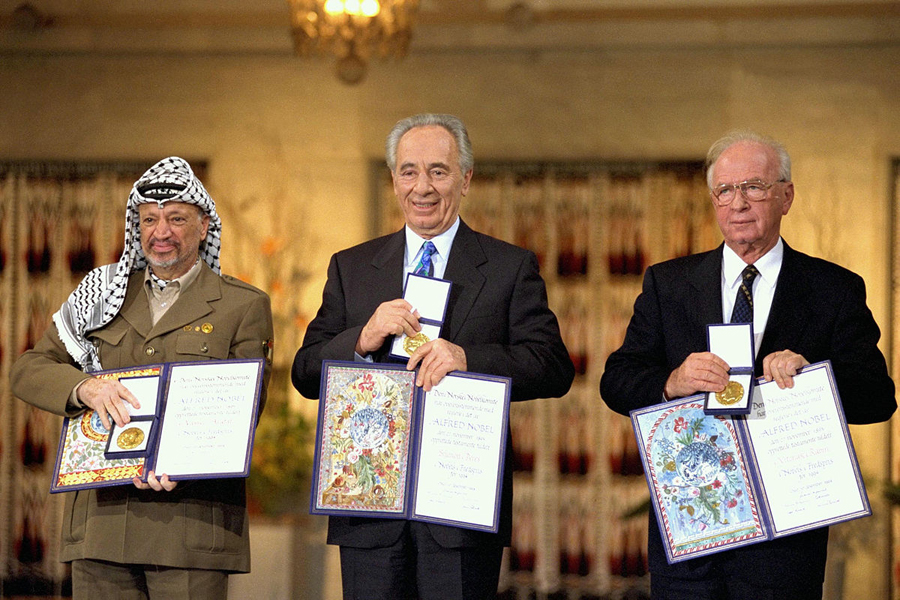In her 2010 collection, Cities, the poet Elaine Feinstein writes of being an undergraduate at Cambridge in 1949. She sees herself as she “teeters…on high heels over the cobbled street…the music of wartime dance bands still inside her”. Born in Liverpool in 1930, she won an…
Author Judith Kerr dies age 95
Denis Norden 1922-2018
Rabbi Lionel Blue has died aged 86 – Judi Herman remembers two encounters with him in the last months of his life
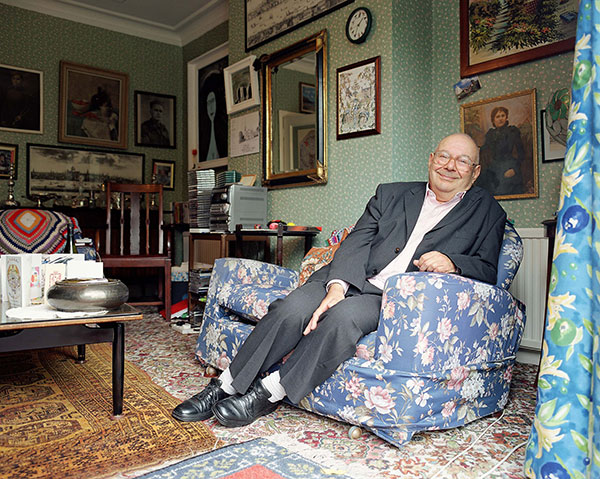 There will be beautiful, insightful and loving obituaries about Rabbi Lionel Blue, the much loved minister, teacher and, famously, speaker on BBC Radio 4's Thought for the Day, from those who knew and loved him well over many years. He was known for his jokes, his insights and his honesty about his homosexuality. Sadly he passed away on Monday 19 December, aged 86. I myself encountered Lionel only at the very end of his life, when he was living in a home in Golders Green, coping with the ravages of Parkinson’s Disease, the cruel condition that rendered it so hard for this extraordinary communicator to do just that, for it made not only movement but also speaking extraordinarily difficult.
There will be beautiful, insightful and loving obituaries about Rabbi Lionel Blue, the much loved minister, teacher and, famously, speaker on BBC Radio 4's Thought for the Day, from those who knew and loved him well over many years. He was known for his jokes, his insights and his honesty about his homosexuality. Sadly he passed away on Monday 19 December, aged 86. I myself encountered Lionel only at the very end of his life, when he was living in a home in Golders Green, coping with the ravages of Parkinson’s Disease, the cruel condition that rendered it so hard for this extraordinary communicator to do just that, for it made not only movement but also speaking extraordinarily difficult.
Last summer I was asked to write a light-hearted tribute to the Leo Baeck College for training Liberal and Reform Rabbis as it turned 60 this year, to be performed at the Liberal Jewish Biennial Conference. I was sent to record Lionel telling one of his trade mark jokes and with extreme effort and gumption he did just that. He also had a great deal to say about his time at the college, of which he was one of the very first two students and that had pride of place in the article I wrote about Leo Baeck College in the October 2016 issue of Jewish Renaissance.
But afterwards he continued to chat to me and I continued to record what he said as I leant close, straining to catch his words. He spoke of being a pioneer, bringing word from the frontier of old age. “My great problems,” he said, “are not the problems of the past but of the future. My problem and the problem of my generation is we are living longer. In my childhood my parents died when they were about 60. Now [people] carry on till they are 80 or 90 and you need a whole new interpretation of Jewish life for them because otherwise you just go round and round and round the same bush. That doesn’t help you very much. For example, I have to ask myself what is the purpose of life for me in an old-age home? That’s what I’m trying to work out here now. I’ve worked out parts of it.”
He paused and I asked, rather simplistically and fatuously, I admit, whether he thought he had something to add to Jewish learning on extended old age now.
“Not to add,” he replied, gently humouring me. “First of all I’d want to know what it is to be an old chap.”
Will you share it with us when you know?
“Of course!” Poignantly he continued: “But the point is you have to learn what it’s like to feel the loneliness of old age even with all the nice pressies you get. What’s the purpose of lingering around being an old person? It’s not easy to find out, but I think that’s what we’ve got to do.”
I continued with a whole lot of guff along the lines of, "Maybe you are like the two spies who went into the Land – you’re going before us and you’re going to give us a message that will make it more understandable.”
Softly sending me up again he replied: “The message is you tend to have too many cakes!”
That wasn’t the last time I visited Lionel. He’d told me during that recording about his love of dogs and how he missed being able to stroke and pet them. I wondered whether I might bring my dog, Bertie the Bedlington terrier to meet him. Reminded of my idea when I saw Lionel again, a guest of honour at the Service of Celebration for Leo Baeck College’s 60th anniversary, I asked if he’d like to meet Bertie and when he said yes, I asked the kind folk who ran the home whether Bertie might visit. To my delight and Lionel’s – the answer was "why not!"
So last month one very excited Bedlington had to learn to restrain himself as he jumped enthusiastically at Lionel and enjoyed being petted by a tentative hand. Bertie is probably not quite up to qualifying as a Pets as Therapy dog, but I like to think he felt the greatness and gentleness of the man in the chair at whose feet he eventually fell asleep. Now Lionel is free of the loneliness, and the pain and frustration he seemed to bear with such grace, outwardly at least. z”l (zichrono livrakha – may his memory be a blessing).
By Judi Herman
Leonard Cohen: A personal response from JR's arts editor Judi Herman
 This is not where you will read erudite analysis or an account of a life, or even of the work. I am simply asking myself and others like me why we have been so profoundly affected by Leonard Cohen's words, music and life.
This is not where you will read erudite analysis or an account of a life, or even of the work. I am simply asking myself and others like me why we have been so profoundly affected by Leonard Cohen's words, music and life.
For a time now, aware that the man who told us all "I'm your man" was an octogenarian, I have been confiding that I hoped he would live to a great age because the world would be a poorer place without him. It was a better place with him in it. I think I feel this way because of the arc of his life, with its many pathways, both sacred and profane, as shared through his music, confided to me and so many others through his gorgeous, elegant poetry and lyrics.
The devout Jew engaged in an honest "I-Thou", one-to-one relationship with the God with whom he wrestles and may, like me, doubt, is also the apparently cheerful, though silent Buddhist. He was also the sublime lover, the dirty lover and the unfaithful lover; but a lover who was always as honest with his earthly lovers as with his God. I never met him but I'm convinced that he would have been the best of companions – despite the fug of tobacco smoke.
Returning to his Judaism, famously self-evident in Hallelujah and If It Be Thy Will, look closer and you will see how often he quotes not just from the scriptures (Old and New Testament) but also from prayers and writings central to the faith into which he was born. Who by Fire picks up powerfully, almost playfully – even blasphemously some might say – on “U-n’ tanneh tokef”, “Let us proclaim the holiness of this day”, an ancient liturgical poem describing the Day of Judgement, an important part of the High Holy Days Liturgy recited at Yom Kippur, the Day of Atonement, when God decides “who shall live and who shall die … who shall perish by water and who by fire…”.
And quoting the opening words of the Kaddish (prayer of mourning) in the title track of You Want it Darker, the album released shortly before his death, “Magnified, sanctified, be thy holy name”, is as much a part of his message that he is ready for imminent death as the words he repeats as a refrain, “Hineini, hineini I’m ready, my lord”. These words, which echo through the Torah from Genesis to Isaiah, are picked up by the cantor at his Montreal synagogue to end the song with a heart-stopping echo. How like Cohen not to go without leaving one last great legacy.
I hope to go into this in more detail in the next issue of Jewish Renaissance, comparing Cohen's lyrics with Nobel Laureate Dylan. But for now, rest in peace Leonard Cohen; z”l (zichrono livrakha – may his memory be a blessing)". You may have reached the age of 82, but for me, as for so many more, your death was untimely, though I'm sure you met it with your usual great grace, ready for this last new experience that you have written about with such beauty.
Canadian singer-songwriter Leonard Cohen has died, age 82
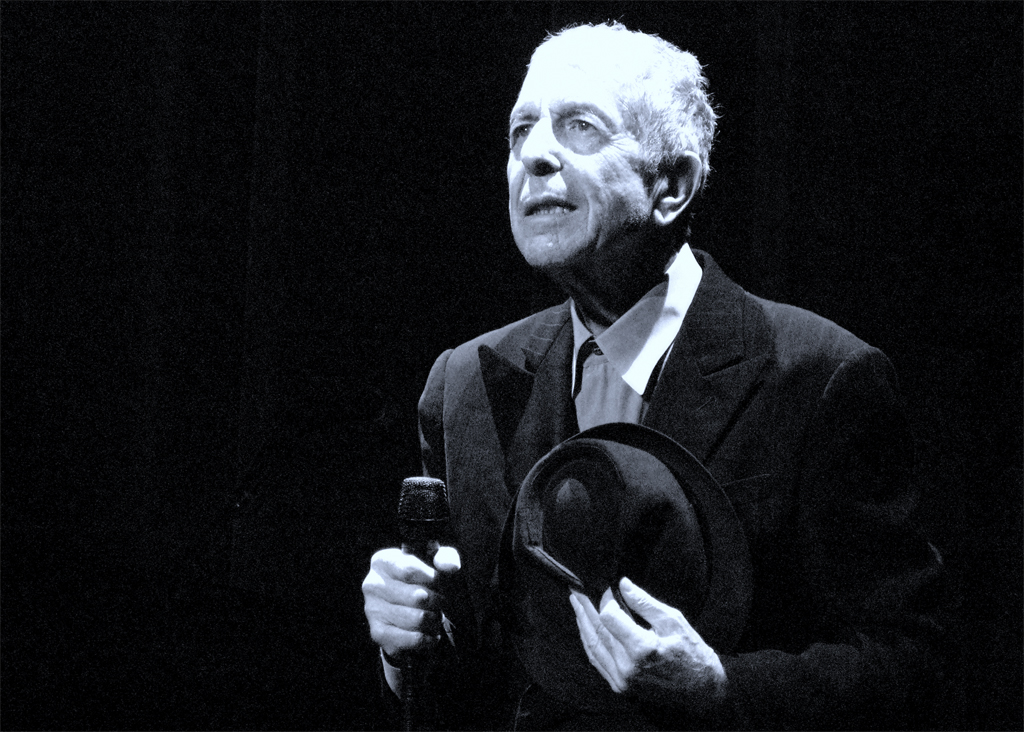 On Monday 7 November, one of music’s most eloquent and able songwriters passed away. Leonard Cohen was 82 when he died peacefully at his home in southern California earlier this week. His son Adam said touchingly in an interview with Rolling Stone, “My father passed away peacefully at his home in Los Angeles with the knowledge that he had completed what he felt was one of his greatest records. He was writing up until his last moments with his unique brand of humour."
On Monday 7 November, one of music’s most eloquent and able songwriters passed away. Leonard Cohen was 82 when he died peacefully at his home in southern California earlier this week. His son Adam said touchingly in an interview with Rolling Stone, “My father passed away peacefully at his home in Los Angeles with the knowledge that he had completed what he felt was one of his greatest records. He was writing up until his last moments with his unique brand of humour."
The record Adam is speaking about is You Want it Darker, which was recently released (21 Oct) and effused the sincere, gravelly tones and orchestral movements he was so well known for.
Born in Westmount, Quebec on 21 September 1934, Cohen grew up in a middle-class Jewish family. Marsha Klonitsky, his mother, was the daughter of a rabbi, while his father, Nathan Cohen, had Polish heritage – his father Lyon Cohen having emigrated from Poland in 1871 and later founding the Canadian Jewish Congress.
While at high school Cohen picked up an appreciation of poetry and by age 20 had published his first poems in a magazine called CIV/n. It wasn’t until the 60s, however, that Cohen began life as a musician. In 1967 he moved to New York, befriended Andy Warhol and penned the song Suzanne, which was to be his first successful foray into the world of music.
Despite a prolific, 60-year career, Cohen never charted highly in the mainstream. His highest ranking song in Canada, Closing Time, reached Number Five, while in the UK it was only the reissue of Hallelujah that ever charted at position 36.
Originally released in 1984, Hallelujah has become the song Cohen is most renowned for. The singer never had much success with it himself, but it was remarkably covered over 300 times, most notably by the late US singer Jeff Buckley, who scored a Number One hit with it.
As well as music, Cohen was also known as an accomplished author. Over the years he published two novels – The Favourite Game (1963) and Beautiful Losers (1966) – and 13 anthologies of poetry.
Eleven albums down the line, in 2005, Cohen was in the public eye for something other than his art after his close friend and manager Kelly Lynch was exposed for misappropriating over $5m from Cohen’s accounts. This hefty loss formed a big part of Cohen’s reasons for writing new music and touring again.
Earlier this year Cohen’s former lover Marianne Ihlen died. She was the Marianne of the song So Long, Marianne, which Cohen wrote about her when the pair dated and lived in Hydra, Greece for much of the 60s. Shortly before Marianne passed Cohen penned her a heartfelt letter saying: “Marianne it’s come to this time when we are really so old and our bodies are falling apart and I think I will follow you very soon. Know that I am so close behind you that if you stretch out your hand, I think you can reach mine.”
The world has lost a truly talented spirit that will live on in Leonard Cohen’s songs, poetry and legacy.
By Danielle Goldstein
Arnold Wesker tribute: The playwright still packed them in at the Royal Court in an affectionate and celebratory look at his life
 “He shone with the sun”, lilted singer Rosie Archer in a soaring paean that took place as part of many poignant moments during an afternoon of tributes to the playwright Arnold Wesker, who died age 83 on 12 April 2016.
“He shone with the sun”, lilted singer Rosie Archer in a soaring paean that took place as part of many poignant moments during an afternoon of tributes to the playwright Arnold Wesker, who died age 83 on 12 April 2016.
Held at the Royal Court Theatre, Wesker's spiritual home despite the theatre having turned down Chicken Soup with Barley (it premiered in 1958 at Coventry’s Belgrade Theatre), the evening was filled with warm memories of the late playwright from luminaries across the arts world.
Mike Leigh spoke of his delight in his teens at discovering this East End working-class dramatist. “What a hero he was. We sought out his plays and read them avidly,” recalled Leigh, reading from a piece based on an article first published in the July 2016 issue of Jewish Renaissance. Later in the Royal Court’s bar, Leigh told me that he had been approached to participate in the event after Wesker’s wife Dusty had shown the organisers the piece.
David Edgar spoke of Wesker’s groundbreaking representation of “political disillusion”; director Fiona Laird remembered her surprise at finding the playwright “charming,” instead of the curmudgeon she had been led to expect. A frail looking Bernard Kops, one of the last of those ‘angry young men’, recalled Wesker’s desire to broaden the reach of culture with his Centre 42 project.
There were some great performances too: Samantha Spiro’s delivery of Sarah Kahn’s final speech (she played Kahn in the Royal Court’s revival of Chicken Soup in 2011) brought tears to my eyes, although puzzlingly she omitted the ultimate rousing imperative, “You've got to care, you've got to care or you'll die!” Ian McKellen performed an excerpt of Chips with Everything with gusto, and Henry Goodman made a mischievous Shylock in a speech from the 1976 play of the same name. Finally, Jessica Raine, who played Beatie in the Donmar Warehouse’s 2014 production of Roots, movingly reprised that character's astonishing final speech.
And there were surprises: who knew Wesker had written lyrics for a Eurovision Song Contest entry? Sadly, Jonathan King rejected Shone With the Sun as “too classical”, otherwise Britain’s Eurovision history might have told a different story. He had been a talented artist too, said set-designer Pamela Howard, who presented several of his fine ink drawings.
As the audience left, speakers played Aaron Copeland’s Fanfare for the Common Man, a favourite with the playwright, and a reminder of the compassion at the heart of Wesker’s own art.
By Rebecca Taylor
CLICK HERE to read Mike Leigh's tribute to Sir Arnold Wesker from our July 2016 issue
Former Israeli president Shimon Peres has died aged 93 - Colin Shindler pays tribute to one of the giants of Israeli politics
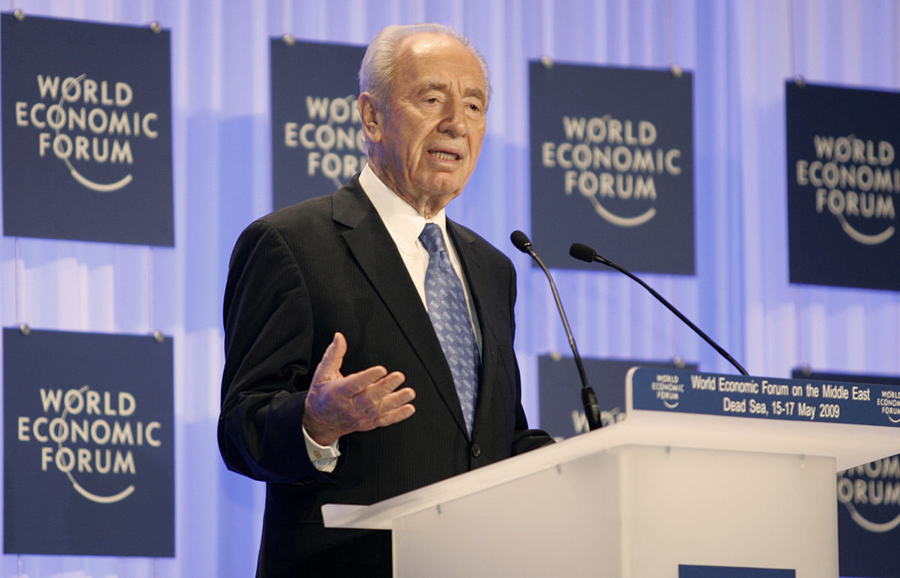 Shimon Peres was the ‘almost’ man of Israeli politics who was expected to win, but always lost. He was prime minister for a few months in 1977 after Yitzhak Rabin’s resignation and then for a similar period following Rabin’s assassination in 1995. His longest time in office as prime minister was in the national unity government with the Likud from 1984-86. He was expected to succeed Yitzhak Shamir in 1990 but then was thwarted by a last minute about-turn by Charedi politicians on orders from their rebbes. He was then expected to defeat Netanyahu in 1995, but the advent of Hamas’s suicide bombers put paid to that hope. Even when he stood for president in 2001, the walkover never happened and Moshe Katsav succeeded to the post instead. Peres only became president in 2007. Such an unprecedented string of disappointments would have crushed most politicians.
Shimon Peres was the ‘almost’ man of Israeli politics who was expected to win, but always lost. He was prime minister for a few months in 1977 after Yitzhak Rabin’s resignation and then for a similar period following Rabin’s assassination in 1995. His longest time in office as prime minister was in the national unity government with the Likud from 1984-86. He was expected to succeed Yitzhak Shamir in 1990 but then was thwarted by a last minute about-turn by Charedi politicians on orders from their rebbes. He was then expected to defeat Netanyahu in 1995, but the advent of Hamas’s suicide bombers put paid to that hope. Even when he stood for president in 2001, the walkover never happened and Moshe Katsav succeeded to the post instead. Peres only became president in 2007. Such an unprecedented string of disappointments would have crushed most politicians.
In his late 20s, Peres became deputy director-general of the Ministry of Defence and was instrumental in persuading France to supply arms to Israel amidst a widespread embargo – including the UK – in the run-up to the Suez war in 1956. He was also present at Sèvres when the collusion pact was agreed between Britain, France and Israel prior to the Suez campaign.
Peres was elected to the Knesset in the 1959 election as a candidate for Mapai, the forerunner of the Labour party. He aligned himself immediately with Ben-Gurion and sided with him when he broke with Mapai in 1965 to form Rafi.
Rafi was the party of the Mapai princes and included Moshe Dayan, Teddy Kollek, Chaim Herzog and many others who saw themselves as future leaders of the country. Peres essentially organised Rafi on Ben-Gurion’s behalf with little funding. He made the first contact with Menachem Begin’s Gahal to investigate whether they had common political interests. Although such contacts were low key, this was the precursor to the defection of this faction of the labour movement to the Right.
Rafi only achieved 10 seats in the 1965 election while Mapai triumphed. For Peres and Dayan this was a disaster since it severely reduced their opportunity of becoming a future prime minister. In 1968, Peres opted with the rest of the Rafi MKs to join the newly established Labour party. Ben-Gurion refused to return and led the rump of his party, now called the State List, which later became one of the founding components of the Likud.
Peres and Dayan led the hawkish wing of Labour and were strongly opposed by Abba Eban and Pinchas Sapir. They wished to integrate the West Bank into Israel’s economy and were often reluctant to offer constructive territorial concessions. This acute factionalism in Israeli Labour meant that there could be no meaningful peace initiatives. With the debacle of the Yom Kippur war in October 1973 with over 2500 dead and up to 8000 wounded, the Agranat Commission’s findings on culpability led to the resignations of Golda Meir and Moshe Dayan. In 1974 Yitzhak Rabin narrowly defeated Peres for the party leadership – and this initiated a 20 year-long rivalry.
As Defence Minister in the first Rabin government, Peres continued to be a standard bearer for the Right and adopted an accommodating position towards the West Bank settlers in cabinet discussions. This was integral to his ongoing war of political attrition against Rabin. His visit to the settlement of Sebastia in December 1975 was seen as a statement of his being amenable to the settlers’ demands.
Following the increase in oil prices, the Arab states used this weapon to isolate Israel. Many countries in the developing world now broke off diplomatic relations with Israel due to Arab pressure. With limited options, Peres paid a clandestine visit to apartheid South Africa in November 1974 and offered to sell the Chalet missile to Pretoria. While the Likud exuded no qualms of conscience, the Labour party did so with great reluctance – and Peres was its chosen candidate to implement this task.
Rabin’s attempts to cure the Labour party of corruption and sloth met with limited success – and he himself resigned when his wife was found to possess an unlawful foreign bank account in Washington. Peres took over as caretaker prime minister and went down to a resounding defeat by Menahem Begin in the 1977 election a few months later.
Peres continued as leader of the Labour party, welcoming the Camp David agreement and peace with Egypt. Yet a late comeback by Menahem Begin in the 1981 election allowed the Likud to pip Labour at the post. Begin’s second government was far more radical than his first and ended in the ill-fated invasion of Lebanon in 1982. During this period Peres turned from the Right to the Left and now aligned himself with Israeli doves. Following the massacre of Palestinians by Christian Phalangists in the camps of Sabra and Shatilla at the end of the war in Lebanon, 400,000 Israelis demonstrated in Tel Aviv – including Shimon Peres.
The electorate in 1984 was divided in their allegiance and this led to the ‘rotation government’ of a Labour-Likud coalition. Peres was prime minister from 1984-86 with Shamir succeeding to the post to serve a further two years. Peres proved to be a very capable leader, withdrawing the troops from Lebanon and fixing a badly damaged economy. It was also a period when Israel moved from a command economy, based on long-held socialist principles to a globalised capitalism – and Peres adjusted to this prospect with great ease.
During Shamir’s premiership, Peres forged the London agreement in 1987 with King Hussein during secret negotiations at the home of Lord Mishcon which was later vetoed by a critical Shamir. Peres expected to become prime minister once more in 1990 with the defeat of the Shamir government in a vote in the Knesset. Haredi backpedalling produced another failure for Peres, but this was a defeat one too many for Labour members and soon he was replaced by the more electable Rabin. As history records, the Labour government, led by Rabin with Peres as Foreign Minister, signed the Declaration of Principles – the Oslo Accord – with Yasser Arafat on the White House lawn in September 1993. Peres significantly appeared far more confident in clasping Arafat’s hand than the reticent and startled Rabin.
The peace process was perhaps the pinnacle of Peres’s career with his vision of a New Middle East and it earned him a Nobel Peace Prize together with Arafat and Rabin.
With his unexpected defeat in 1996 and the election of Netanyahu, Peres’s career seemed to be over. He held secondary positions within Labour and he and his Oslo colleagues were marginalised when Labour returned to power under Ehud Barak in 1999. Peres held the nondescript post of Minister of Regional Cooperation.
At the beginning of the 21st century, the al-Aqsa Intifada and its toll of Israeli victims, targeted by Islamist suicide bombers, persuaded the electorate to bring back Ariel Sharon to protect them. Peres was brought in as Foreign Minister, but he differed fundamentally with Sharon in that he wanted to negotiate with Arafat and to utilise his good relationship with him. Sharon, however, repeatedly commented that there could be no negotiations while the violence continued. A new generation of Labour politicians finally displaced the octogenarian Peres in 2005 and he lost its leadership for the last time.
Peres and Sharon were both disciples of Ben-Gurion and members of Mapai in the 1950s. While Peres led the right wing of Labour and eventually became a dove, Sharon became a founder of the Likud in 1973. Neither were attached to keeping Gaza and the West Bank for either ideological or religious reasons. Peres could therefore easily support the unilateral withdrawal from Gaza in 2005 and to leave Labour to join Sharon’s new party, Kadima.
In 2007 he left formal party politics to finally become president. His inspiring and confident statements in the depths of adversity chimed with Diaspora and western sentiments, but clearly grated on the nerves of the Likud and parties on the far Right. After seven years at the helm, he retired from the presidency in 2014.
Peres was a cultured man who spoke several languages and wrote poetry. Like Abba Eban, he was seen as ‘foreign’ and, for some, untrustworthy. Yet he managed to survive in the bear-pit of Israeli politics and to weather every twist and turn of fortune. His charm and sophistication will be missed in diplomatic circles. His transformation from Szymon Perski from Vishnyeva in Belarus into Shimon Peres, builder of the Hebrew republic, is a reflection of how the Jews have moved from the margins of history to its mainstream after two millennia of dispersion. Israel has lost a unique voice.
By Colin Shindler, an emeritus professor at SOAS, University of London
British playwright Sir Arnold Wesker died aged 83 on April 12th: JR's arts editor Judi Herman recalls the pleasure and privilege of sharing lunch and confidences with the great man
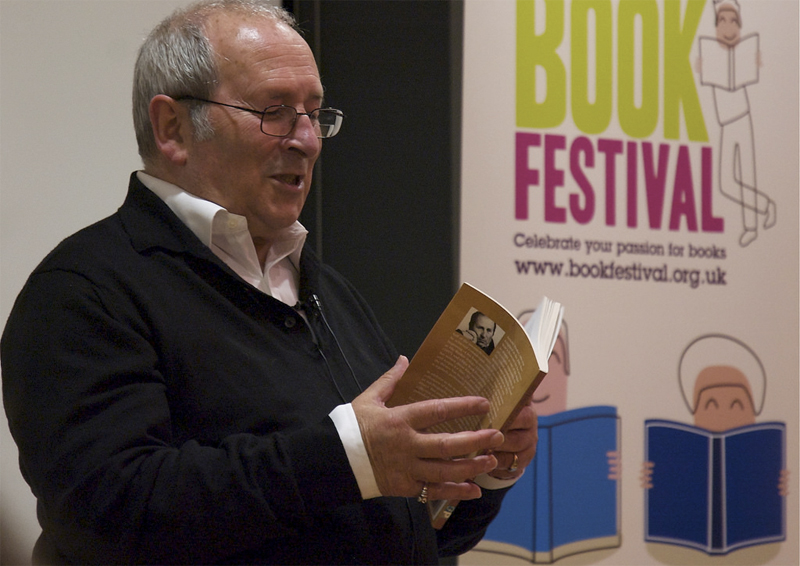 Sir Arnold Wesker, who has died at the age of 83, first came to prominence in the late 1950s as one of the playwrights dubbed ‘Angry Young Men’, though he later rejected this label. I would say advisedly so, for his famous trilogy of plays drawing on his background in the Jewish East End and upbringing in a family with a strong Communist identity, introduced one of the most memorable positive heroines of post-war literature. Beatie Bryant, the Norfolk-born heroine of the middle play in the trilogy, Roots (the first being Chicken Soup with Barley, and the last is I’m Talking About Jerusalem).
Sir Arnold Wesker, who has died at the age of 83, first came to prominence in the late 1950s as one of the playwrights dubbed ‘Angry Young Men’, though he later rejected this label. I would say advisedly so, for his famous trilogy of plays drawing on his background in the Jewish East End and upbringing in a family with a strong Communist identity, introduced one of the most memorable positive heroines of post-war literature. Beatie Bryant, the Norfolk-born heroine of the middle play in the trilogy, Roots (the first being Chicken Soup with Barley, and the last is I’m Talking About Jerusalem).
I was lucky enough to meet Sir Arnold when Roots was wonderfully revived at the Donmar Warehouse in 2013 and I was invited to meet this great, delightful and erudite man at the Brighton home he shared with his beloved wife, the supremely resourceful and devoted Dusty, on whom the radiant Beatie was modelled. I say invited, because the hugely hospitable Dusty made what she called "a light lunch", to which my husband Steve was also invited and it was truly memorable – both for Dusty’s cooking and for the conversation over lunch. And that’s on top of what I was privileged to record for JR OutLoud with Arnold while lunch was cooking, when he spoke at length about the inspiration for Roots and much more about his life and work.
Arnold was still supremely articulate despite the Parkinson’s Disease that dogged his later years. I had also had the pleasure of speaking to him on the phone some years before about Shylock, his take on The Merchant of Venice, in which Shylock and the Merchant of Venice are close and supportive friends and the pound of flesh the result of a nonsensical bond, genuinely made as a gesture to the draconian Venetian authorities, that goes horribly wrong. But meeting him in person and being welcomed into their home by this wonderfully complementary pair will always be a very special memory for me. My heart goes out to Dusty and I am sure all readers will join with me in wishing her long life.
By Judi Herman
Listen to Sir Arnold Wesker discuss his life and works in 2013 on JR OutLoud.
Pioneering Jewish historian David Cesarani passed away aged 58 this week – JR editor Rebecca Taylor recalls their first meeting
 We were so sad to hear of the death of the pioneering historian David Cesarani on October 25. He contributed over the years to Jewish Renaissance, but here JR editor Rebecca Taylor recalls her first meeting with him at the legendary Kosher Luncheon Club in London's East End.
We were so sad to hear of the death of the pioneering historian David Cesarani on October 25. He contributed over the years to Jewish Renaissance, but here JR editor Rebecca Taylor recalls her first meeting with him at the legendary Kosher Luncheon Club in London's East End.
I first met David Cesarani in the late-1980s. I must have been about 20-years-old and was writing my final-year dissertation for my English degree at Cambridge University. I had chosen a geekily obscure area of literature to focus on – a body of work with political leanings that emerged from the Jewish East End in the 1930s. It focused on novels such as Simon Blumenfeld's Jew Boy and William Goldman's East End My Cradle, which grappled with relating the immigrant experience alongside experimenting with the new forms of modernist writing, and pitched all this against a background of political debate about how the 'working class' should best be represented artistically.
David suggested we meet at the Kosher Luncheon Club canteen on Whitechapel's Greatorex Street. With its mix of customers in cloth caps or kippah, brusque waiters and sky blue paper tablecloths, the canteen was an East End institution – and something of an eye-opener for a girl from the deepest depths of south London.
Over plates of fried fish I explained to David what I wanted to explore and he patiently and kindly listened. Already at the forefront of work with the All-Party Parliamentary War Crimes Group that was investigating Nazis who had come to live in the UK, and a leading figure in Holocaust education, he was just about to take up the post of director of the Weiner Library. But he treated my half-formed theories and un-focused questionswith absolute seriousness.
He had already written an insightful essay on the East End background to Blumenfeld's Jew Boy, which had appeared in the London Journal, and he was a wealth of information on the period (his excellent book, The Making of Modern Anglo-Jewry appeared soon after we met), but more than that he encouraged me to interview the writers – Willy Goldman was still alive at that time – and speak to others such as the historian Professor Bill Fishman who had also lived the period. He was generous with his ideas and contacts, afterwards sending memos and notes with follow up information. Looking through my old college folders recently I found a detailed list that David had carefully written up for me of books and archives that I should pursue, as well as contacts for historians such as Ken Worpole and Brian Cheyette.
And arranging the meeting in the canteen was genius – the perfect antidote to long days of locking myself away in the university library, picking through treatise on social realism in yellowing 1930s copies of the Left Review. Like all the best historians, David knew how to bring the past to life – and just in time – the canteen closed down a few years after our fried fish meal.
I only encountered David again years later when I became involved in JR in 2014. He had written for the magazine on a number of occasions on subjects such as funding for Jewish studies, and the Jewish involvement in World War I. But he was one of the first people I commissioned for the magazine, when I asked him to write about the rise of the far right in Europe in 2014. As ever he was the voice of reason and rationality, refusing to take the knee-jerk reaction that European antisemitism was unequivocally on the rise.
His last piece for us was an eloquent and affectionate obituary in April's issue following the death of Bill Fishman. I never imagined that I would soon be writing one for David. He will be sadly missed by the Jewish community and far beyond.
By Rebecca Taylor
You can read more about the life and work of David Cesarani on The JC, Guardian and Forward websites.


